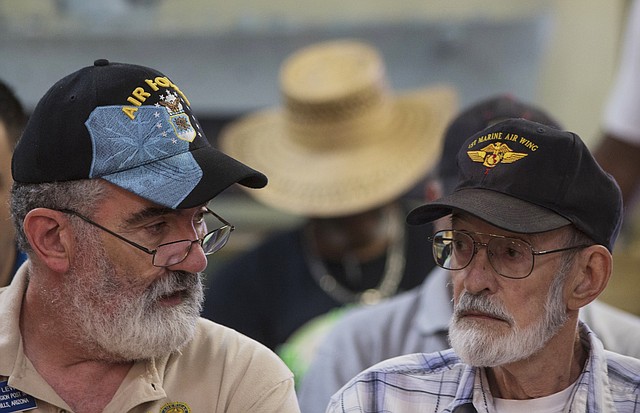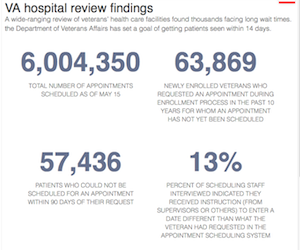VA-care legislation clears Senate 93-3
FBI to investigate agency’s practices
Vietnam veteran Gene Stoesser, right, talks with Veterans Crisis Command Center volunteer Chuck Lewis, left, while he waits for an appointment Tuesday, June 10, 2014, at American Legion Post 1 in Phoenix. Stoesser was told on May 2, 2014, that he needs heart surgery. The American Legion has set up a crisis center in Phoenix to help veterans get medical care in a first-of-its-kind event in the American Legion's nearly 100-year history.
Thursday, June 12, 2014
WASHINGTON -- The Senate acted Wednesday to help thousands of military veterans enduring long wait times for VA medical care, as the FBI revealed it has opened a criminal investigation into a Veterans Affairs Department reeling from allegations of falsified records and inappropriate scheduling practices.
The Senate bill, approved 93-3, makes it easier for veterans who have encountered delays getting initial visits to receive VA-paid treatment from local doctors instead.
Arkansas' two U.S. senators backed the legislation.
"We need to restore faith in the VA health system and that begins with accountability and following through with our promises," Republican Sen. John Boozman said before the vote, in his first speech on the Senate floor since heart surgery in April. "The VA needs to correct the systemic problems that are preventing our veterans from accessing the high quality health-care services offered."
Democratic Sen. Mark Pryor also welcomed its passage.
"This bipartisan legislation is a promising step toward ensuring our veterans are receiving the healthcare and benefits they've earned," he said in a written statement. "Arkansas veterans will benefit from increased access to doctors and accountability at the VA."
The Senate measure closely resembles a bill approved unanimously Tuesday in the House, prompting optimism among lawmakers from both parties that a compromise version could be on its way soon to President Barack Obama for his signature. The White House said Wednesday that Obama supports the Senate bill.
The Senate bill would authorize about $35 billion over three years to pay for outside care for veterans, as well as hire hundreds of doctors and nurses and lease 26 new health facilities in 17 states and Puerto Rico.
The VA released an audit this week showing that more than 57,000 veterans have had to wait at least three months for initial appointments. Another 64,000 veterans who asked for appointments over the past decade never got them.
"The cost of war does not end when the last shots are fired and the last missiles are launched," said Sen. Bernie Sanders, I-Vt., chairman of the Senate Veterans Affairs Committee. "The cost of war continues until the last veteran receives the care and the benefits that he or she is entitled to and has earned on the battlefield."
Sen. John McCain, R-Ariz., who drafted the bill with Sanders, called the bill "a beginning -- not an end -- to the efforts that must be taken" to address the crisis affecting veterans' health care.
"Make no mistake: This is an emergency," McCain said.
McCain's comments came in response to complaints from Alabama Sen. Jeff Sessions and other Republicans that the bill was a "blank check" to spend billions of dollars with little or no way to rein it in.
Sen. Tom Coburn, R-Okla., said the VA has "plenty of money," adding: "It's management and accountability and honesty in treating the veterans" that is needed to improve veterans' care.
The VA, which serves almost 9 million veterans, has been reeling from mounting evidence that workers falsified reports on wait times for medical appointments to mask frequent, long delays. VA Secretary Eric Shinseki resigned over the scandal May 30.
The Senate bill, like the House measure approved Tuesday, would let veterans facing long delays for appointments or living more than 40 miles from a VA facility choose to get care from nonagency providers for the next two years. Some veterans already get outside care, but the process is cumbersome and riddled with delays, veterans and their advocates say.
The Senate bill also would restrict controversial bonuses given to VA employees for meeting certain performance goals and would make it easier to fire top VA officials. Legislation approved in the House would ban bonuses outright through 2016 and would not include employee safeguards provided in the Senate bill.
Sanders said he was "absolutely confident" that the House and Senate negotiators will be able to reach agreement on a compromise bill.
The Senate vote took place the same day the FBI revealed it has opened a criminal investigation into the VA.
FBI Director James Comey said Wednesday that the investigation was being led by the agency's field office in Phoenix, which he described as the "primary locus of the original allegations" being investigated by the VA's Office of Inspector General.
"We're working with the VA IG to follow it wherever the facts take us," Comey told the House Judiciary Committee.
The inspector general said in a report last month that 1,700 veterans seeking treatment at the Phoenix VA hospital were at risk of being "lost or forgotten." The VA has confirmed that at least 35 veterans died while awaiting treatment in Phoenix, although officials say they do not know whether the deaths were related to long waiting times for appointments.
The Justice Department had said that federal prosecutors were reviewing documents from the inspector general to determine whether to begin a full-fledged investigation. The involvement of the FBI represents an escalation into concerns of possible criminal conduct by VA employees, though it remains unclear whether investigators will find any basis for prosecution.
Richard Griffin, the VA's acting inspector general, issued a report last month that confirmed allegations of excessive waiting time at VA hospitals and inappropriate scheduling practices. He told lawmakers his investigators were probing for wrongdoing at 69 agency medical facilities, up from 42 two weeks ago
Information for this article was contributed by Matthew Daly and Eric Tucker of The Associated Press; by Richard Simon of the Los Angeles Times; and by staff members of the Arkansas Democrat-Gazette.
A Section on 06/12/2014

